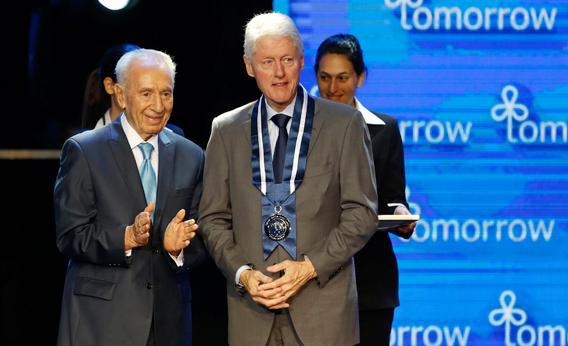JERUSALEM—Anyone who showed up today to hear Bill Clinton accept the Presidential Medal of Distinction, Israel’s highest honor, might have expected the firebrand orator, the fierce campaigner who so adeptly served as id to Barack Obama’s superego last fall. But the Clinton who spoke today, to a packed, largely English-speaking audience at Jerusalem’s International Convention Center, was elegiac, almost wistful, something of a paradox at the opening session of a presidential conference with the theme “Facing Tomorrow.”
It was a morning of strange moments, featuring former leaders who were free to speak openly in ways they once couldn’t. From Tony Blair’s flawless Hebrew “todah rabbah” (thank you) or Rahm Emanuel’s pitch for Chicago that even had Blair wondering out loud whether he could relocate there, the sensibility was nostalgic and oddly reflective.* But it was Clinton’s reflections on the meaning of “tomorrow” that seemed more Hamlet than Annie.
Accepting the medal from Israeli President Shimon Peres, Clinton mused that the tribute film that had just been screened in his honor was the sort of thing that should be saved until “after one passes.” He then launched into a paean to Peres, whom he lauded as a “personal friend and a national treasure.” Then he pivoted to quote Rudyard Kipling, paraphrasing the observation that “everyone who is in our group is us; everyone else is them.” He noted that the “whole of human history has been a constant battle to redefine who is ‘us’ and who is ‘them.’ ” Confessing that he had made mistakes, Clinton singled out his failure to respond to the genocide in Rwanda as his “greatest mistake”—a tragedy that occurred so quickly and over so few days that “we never even had a meeting in the White House about it.”
Clinton explained that he went to Rwanda to apologize in 1998 and spoke of the ways the people he met there took responsibility for their own failures, their own healing, and that in his view that “requires getting rid of things that divide us, including seeing ourselves as victims.” He mused that while it is nice to receive awards, there is no perfect warrior for peace, and he talked about how all of us wake each morning battling to balance our optimism against our “fear, anger, and resentments.” Clinton said that while there are no perfect solutions to the crisis in the Middle East, the “key is to expand the definition of ‘us’ and shrink the definition of ‘them.’ “
“I’m just asking you to think about that,” he said, the way he might suggest buying a Prius, or pomegranate juice.
Clinton closed, saying that he learned in Africa that when a neighbor says, “Good morning, how are you?” you don’t say, “Fine, thanks,” but rather, “I see you.” He pondered what the world would be like if we could strive to incorporate “I see you” into our desperate international contests between “us” and “them.” Then he closed by repeating, “None of us is perfect. Stay on the path.”
Maybe Clinton was feeling wistful because he was being feted for what he had tried but ultimately failed to accomplish in the region. Maybe he was feeling melancholy because most of his partners in that effort are either dead or very late in life. (Shimon Peres is celebrating his 90th birthday this week with much De Niro, Streisand, and Sharon Stone.) Or maybe this is a new iteration of Clinton, as John Harris and Maggie Haberman noted in Politico this week: an “autumnal” Clinton seeking to translate political goals into personal, even spiritual themes. Musing on his own imperfections, his own struggles with despair, Clinton was less charming than I have seen him—no Slick Willy here—but strangely more urgent. The ovation was deafening.
Maybe it’s just the place, or maybe it’s the time in his life, but Clinton had somehow channeled the tetchy old prophets of the Old Testament: Change your heart, repent, try harder, let go. Less geopolitics, more church basement.
It suits him.
*Correction, June 20, 2013: This piece originally misspelled the Hebrew spelling for “thank you.” (Return.)
